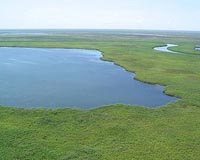| . |  |
. |
Caracas, Venezuela (UPI) Nov 16, 2009 Venezuelan President Hugo Chavez is planning to enlist Cuban help with an ambitious cloud-seeding operation in the hope of inducing rain to ease drought in the country. Chavez made a brief declaration about bombarding clouds over Venezuela with silver iodide, the standard technology for inducing rain, as he received families of five Cubans convicted of spying in the United States. Electricity and water shortages have intensified hardship in the oil-rich state. Although officials blame the El Nino phenomenon for depleting water levels in reservoirs used for hydroelectric power generation, critics of the government blame poor planning and mismanagement of the state-run utilities. Most of the criticism was stifled as the government cracked down on privately run media. Chavez said Cuban scientists who would help his government with the weather manipulation project arrived in the country and have been working on plans for bombardment of clouds to produce much-needed rain. He did not mention a timetable for the urgently needed water to refill the reservoirs. But he said he would fly with the scientists to supervise the operation from specially equipped aircraft. Cloud seeding has been practiced by China, most recently during a drought this year, but has also been blamed for unpredictable -- and sometimes disastrous -- results. In China weather altering was blamed for a snow blizzard that killed at least 40 people and caused more than $500 million in damages. The president's latest pronouncement on easing the shortages of electricity and water has angered residents and added fuel to the opposition's muted campaign against the Bolivarian revolution of Chavez. Earlier this month Chavez accused Venezuelans, including businesses, of wasting water and warned of tough punitive measures. He advised people to use torches when using the toilet after bedtime and to limit showering to three minutes. Jacuzzis, watering of lawns and flowerbeds and filling of swimming pools have all been banned. Chavez has responded to the shortages by creating a new ministerial office to deal with the electricity and power shortages but has not responded to criticism of the state takeover of the utilities in 2007. According to critics, the nationalization derailed plans for infrastructural reforms. Critics say the water and power sectors are in urgent need of new investment. The official Venezuelan news agency ABN made no mention of shortages and rationing but hailed progress in social tourism that has benefited the people of Venezuela and Cuba. It said that 60 Venezuelans who had visited Cuba as part of a social tourism program had returned home. News of events in Venezuela reaching the outside world has been greatly curtailed since the government shut down privately owned broadcast and print media last summer. Share This Article With Planet Earth
Related Links Water News - Science, Technology and Politics
 Sudan's White Nile marshes threatened by oil pollution
Sudan's White Nile marshes threatened by oil pollutionThar Jath, Sudan (AFP) Nov 16, 2009 Oil production in Sudan's Unity state is contaminating water, spreading disease to humans and cattle and threatening the world's largest inland wetlands, according to a survey released Monday. Oil represents 95 percent of Sudan's exports and is both a source of huge tension between between Khartoum and the semi-autonomous south and the last thing forcing the former civil war foes to work ... read more |
|
| The content herein, unless otherwise known to be public domain, are Copyright 1995-2009 - SpaceDaily. AFP and UPI Wire Stories are copyright Agence France-Presse and United Press International. ESA Portal Reports are copyright European Space Agency. All NASA sourced material is public domain. Additional copyrights may apply in whole or part to other bona fide parties. Advertising does not imply endorsement,agreement or approval of any opinions, statements or information provided by SpaceDaily on any Web page published or hosted by SpaceDaily. Privacy Statement |